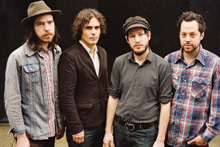“Songwriting is a fun thing. I don’t put too much pressure on it because it doesn’t help anybody and it doesn’t help the song,” says Vetiver leader Andy Cabic.
Looking at the near-constant state of flux that has defined Vetiver’s existence over its five-year history, it’s clear that Cabic doesn’t put too much pressure on lineup stability either. Initially starting out as a solo acoustic vehicle for Cabic’s folk-inspired material, Vetiver morphed into a revolving-door consortium before settling on a more concrete lineup for its last two albums, last year’s covers collection, Thing of the Past, and the brand new Tight Knit. Apparently, though, bandmembers still come and go as a matter of course.

And Cabic isn’t fazed.
“I have a new bass player and keyboard player and haven’t even played with them yet,” he says. “And that’s who I’ll be touring with for the next few months.”
Though Cabic concedes that adapting his recorded material to an ever-shifting group of players dose present its challenges, he also says that “that’s the fun part.”
“I think it helps when you have songs that are a little elastic—or very simple, which mine tend to be,” he says. “We play songs from the first album with bass, drums, and keys. None of those things were on that album, but the songs just take new forms.”
Fans familiar with Vetiver’s recorded output can expect significant modifications in the arrangements, as Cabic and company like to allow themselves breathing room on the material. But, because of Vetiver’s newest arrivals, even Cabic himself can’t forecast how flexible the band will be by the time it hits Asheville.
“With a lot of this stuff, I don’t know myself, and I’m looking forward to finding out,” he says.
Which is to say that the sound will take shape onstage, spontaneously, as Vetiver makes its way through its live dates. Because Cabic lives in San Francisco while his bandmates live in other parts of the country, he also doesn’t put too much pressure on rehearsing. He does, however, stress that the rapport between guitarist Sanders Trippe and drummer Otto Hauser provides a solid foundation for incoming players to work with. Still, Cabic’s casual attitude reflects how friendship has become an integral component of his work ethic.
“Most of the people in the group aren’t disagreeable,” he explains. And, while he plays the central role as principal songwriter and “arbiter of the sound” during the recording process, the final product depends heavily on contributions from the other musicians. “But there isn’t disagreement,” he says.
On the other hand, Vetiver’s surface accessibility belies the concentration and craft that goes into it.
“From moment to moment in a song, simple things are actually comprised of more complicated things, details that are labored over,” Cabic says. “It’s not terribly casual, actually. It’s more managed. Conversely, there might be a song that works better if it’s not so managed, where things are captured more spontaneously, but the actual acknowledgment and the set-up to make that determination is thought out.”
Somewhere in this juxtaposition between looseness and detail, Vetiver forges a fresh brand of folk (for lack of a better term) that spans the whole continuum between acoustic and electric modalities. (As opposed to, say, Neil Young, who alternates between the two approaches in a more polar fashion.) Within this variation, however, Vetiver’s dynamics still tend towards quiet. Arguably, the band’s restraint provides a richer, more subtle palette of emotion and expression to draw from. And, while Vetiver instantly recalls the warmth of and grain of 1970s production values, the band conveys a strikingly modern sensibility. Appearances to the contrary, Cabic isn’t interested in recreating the past—or fashioning Vetiver as a retro act.
“By and large the music I listen to isn’t from now. But it’s not that I’m beholden to a certain decade at all,” he says. “I’m beholden to things that have a mark of quality to them. It can be a New Order track that still holds up.”
As far as originality is concerned, Cabic, again, doesn’t put too much pressure on himself. Nor does he “get too hung up” on genre integrity. A Greensboro resident during the ‘90s, Cabic comes from a rock background. When he lived in North Carolina, he played guitar with the Raymond Brake in a style that he describes as “contemporary with what was going on in the North Carolina indie scene at the time with bands like Erectus Monotone, Superchunk, Polvo and Archers of Loaf.” Since switching to a folkier approach, he explains, his writing has been more geared towards staying consistent with his own work than keeping with genre convention on the one hand or doing something totally new on the other.
“Innovation happens through a combination of things that you have no control over,” he says. “What I do have control over is the quality and intent and trying to put something good out there.”
[Saby Reyes-Kulkarni is a freelance writer.]
who: Vetiver, with Larkin Grimm
what: Innovative folk
where: The Grey Eagle
when: Wednesday, March 25 (8 p.m. $8/$10. www.vetiverse.com or www.thegreyeagle.com)



Before you comment
The comments section is here to provide a platform for civil dialogue on the issues we face together as a local community. Xpress is committed to offering this platform for all voices, but when the tone of the discussion gets nasty or strays off topic, we believe many people choose not to participate. Xpress editors are determined to moderate comments to ensure a constructive interchange is maintained. All comments judged not to be in keeping with the spirit of civil discourse will be removed and repeat violators will be banned. See here for our terms of service. Thank you for being part of this effort to promote respectful discussion.